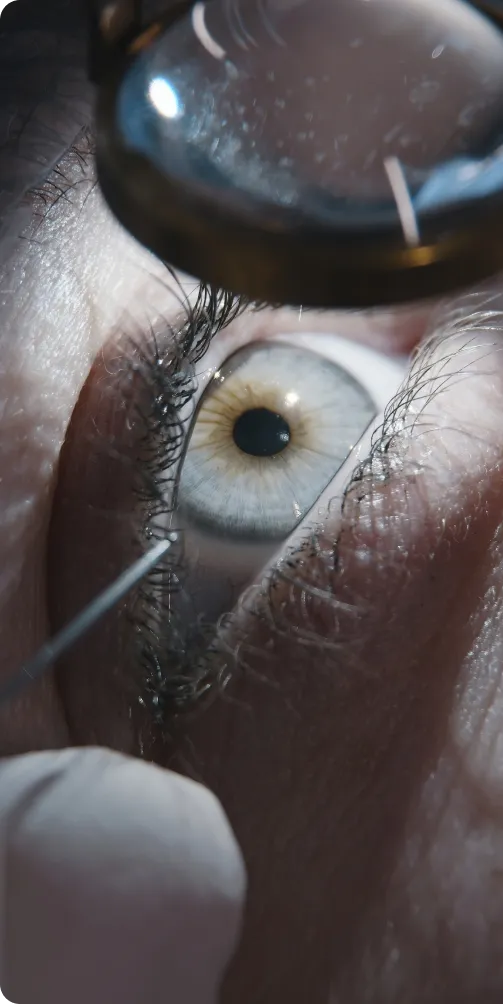Cataract Procedures

MBBS (S'pore), MRCSEd (Ophth, UK), MMed (Ophth, S'pore), FRCSEd (Ophth, UK), FAMS (Ophth, S'pore)
Cataract Procedures
Are you planning to have cataract surgery? If so, you may have two surgical options:
Conventional cataract surgery is one of the most common surgeries in the world. It is recognized as being safe and effective. Bladeless cataract surgery on the other hand provides some advantages for a certain group of patients. So how do you decide which type of cataract surgery to have? Here are some things you should understand about both kinds of cataract surgery. Talk with your ophthalmologist about which is best for you. Feel free to get another eye surgeon's opinion as well.
2 Types of Cataract Surgery

Conventional Cataract Surgery (Phacoemulsification)
Phacoemulsification is the name for conventional cataract surgery. Your eye surgeon creates a small incision in your cornea by hand with a blade. A small instrument in then inserted through this opening. It goes behind your pupil where the eye’s lens sits in a capsule. Your eye surgeon creates a round opening in the capsule and inserts a pen-shaped probe through the opening.
The probe applies sound waves (ultrasound) to break up the cloudy lens and the broken pieces are sucked out before an artificial intraocular lens (IOL) is placed. The wound is usually self-sealing and stiches are not needed.
Benefits of Phacoemulsification
- Safe & efficient

Bladeless Cataract Surgery (Femtosecond)
The FDA-approved LenSx® laser system is based on the same femtosecond technology used during bladeless LASIK procedures. The system uses integrated optical coherence tomography (OCT) which captures precise, hi-res images of the patient's eyes. It gives the eye surgeon image-guided control and the ability to plan and customize each procedure to the unique characteristics of the patient's eye.
The femtosecond laser has replaced many of the steps in the cataract surgery that were previously performed by human hands, i.e., resulting in less surgical error and better predictability of outcomes. Results are more precise than any other previous or current methods of cataract surgery.
At the Mt Elizabeth Hospital, Dr Leo Seo Wei uses the femtosecond laser to make the corneal incisions, create a perfect size capsulotomy and break apart the cloudy cataract lens. She is one of the few eye specialists in Singapore doing bladeless cataract surgery.
Benefits of Bladeless Surgery
- More architecturally round and centred openings created
- Less energy required for lens phacoemulsification
- More precise cornea cuts
Note - Bladeless cataract surgery is suitable for most people except those with specific cornea disease, glaucoma, poorly dilating pupils or those who cannot tolerate the suction used to stabilise the eye
Disadvantage of Bladeless Surgery
- More expensive
Speak with us today at 6737 8366 for reliable and professional advice.
Modern Cataract Treatment
A cataract cannot be treated with medication or corrected with eyeglasses. The cloudy cataract lens must be surgically removed. Cataract surgery is the most frequently performed surgical procedure in the world and is widely regarded as safe and effective.
Eye measurements to calculate the correct intraocular lens
Same-day procedure with a local anaesthetic such as eye drops and injections.
First day after surgery, then for approximately a month, as needed
Periodic check-ups by your eye doctor
Risk
Complications after cataract surgery are uncommon, and most can be treated successfully.
- Retinal detachment
- Infection
- Bleeding
- Swelling
- Drooping eyelid
- Dislocation of artificial lens
- Inflammation
- Glaucoma
- Loss of vision
- Secondary cataract
Your risk of complications is greater if you have another eye disease or a serious medical condition. Occasionally, cataract surgery fails to improve vision because of underlying eye damage from other conditions, such as glaucoma or macular degeneration. If possible, it may be beneficial to evaluate and treat other eye problems before making the decision to have cataract surgery.
Safety & Experience Matter In Cataract Surgery Our Clinic's Cataract Expertise
Our Singapore Cataract Surgeon

Dr Leo Seo Wei
Senior Consultant Ophthalmologist
Dr Leo Seo Wei is a Senior Consultant Ophthalmologist in Singapore with over 20 years of experience in cataract treatment. Her career spans extensive practice and specialised training in Singapore and the United States, where she received numerous awards and valuable stints in ophthalmology.
Well recognised for her expertise in cataract, strabismus, myopia control and paediatric ophthalmology, Dr Leo has been invited to teach, speak and conduct live surgical demonstrations at international conferences and masterclasses across Asia-Pacific, Europe and the USA. She has also published numerous peer-reviewed articles, reflecting her commitment to advancing ophthalmic care and sharing knowledge worldwide.

#10-04 Mount Elizabeth Medical Centre, 3 Mount Elizabeth, Singapore 228510
Tel : +65 6737 8366
Emergency hotline: +65 9668 2229
Email : info@drleoeyespecialist.com
WhatsApp for quick reply
